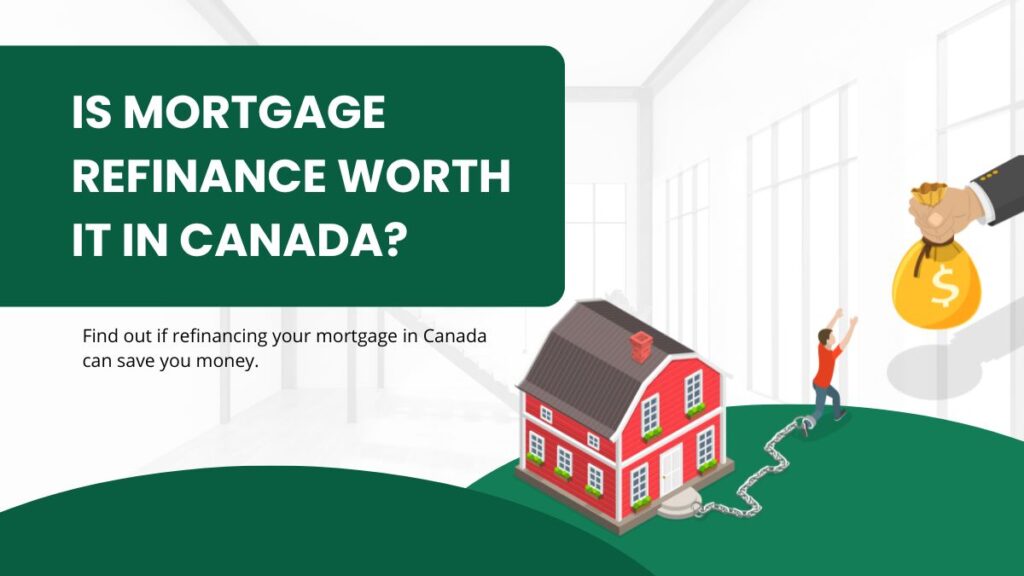A mortgage is a big commitment, but it doesn’t have to stay the same. Is mortgage refinance worth it in Canada? A residential mortgage broker can guide you in finding the best option for your situation. Refinancing lets you replace your current mortgage with a new one that works better. It can lower your payments, give you extra cash, or help consolidate debt.
Mortgage rates go up and down. A recent survey shows only about one in three Canadians are considering refinancing to manage rising costs, down from nearly 40% in previous years. Some want lower payments, while others need extra cash.
With home prices, inflation, and interest rates changing, is now the right time to refinance? A residential mortgage broker can help you make the best decision. Let’s find out.
Is mortgage refinance worth it in canada?
Thinking about refinancing your mortgage in Canada? Discover if it’s the right move to save money and lower your payments!
Mortgage Refinancing in Canada: What You Need to Know
Is mortgage refinance in Canada the right move for you? Here’s what you need to know before making a decision!
What Is Mortgage Refinancing?
Mortgage refinancing means replacing your existing mortgage with a new one. Homeowners do this to secure a lower interest rate, access extra funds, or adjust their loan terms. The process involves applying with a lender, proving you can afford the new loan, and covering associated fees.
Types of Mortgage Refinancing
Looking to refinance your mortgage? Discover the different options that can help you save money or access cash.
Rate-and-Term Refinance
Lowers your interest rate or changes your loan term.
Helps reduce monthly payments or save money in the long run.
Cash-Out Refinance
Allows you to borrow more than what you owe and get the difference in cash.
Use the cash for home improvements, paying off debt, or other needs.
Debt Consolidation Refinance
Combines other debts (like credit cards or loans) into your mortgage.
May lower your interest rate and simplify payments, but increases your mortgage balance.
Home Equity Line of Credit (HELOC) Refinance
Replaces your mortgage with one that includes a line of credit.
Gives you access to funds for things like repairs or projects. Interest rates can change, affecting payments.
Shortening the Loan Term Refinance
Increases monthly payments but helps you pay off the mortgage faster and saves on interest.
Switches your mortgage to a shorter term, such as 15 years instead of 30.
How Is Refinancing in Canada Different?
Discover the unique factors that make refinancing in Canada stand out! From provincial regulations to market influences, learn how Canadian homeowners navigate the refinancing process differently than in other countries.
Stress Test: Lenders check if you can afford payments at higher interest rates. This is required even if you’re just renewing or switching lenders.
Fees & Penalties: Ending your mortgage early may come with fees. These can vary based on your lender and terms, so it’s important to know what they are.
Home Equity Limits: You can borrow up to 80% of your home’s value when refinancing. For example, if your home is worth $500,000, you could borrow up to $400,000.
Interest Rates: You can choose between fixed or variable rates. Fixed rates stay the same, while variable rates may change with the market.
Qualification Criteria: Lenders look at your credit score, income, and debt to decide if you qualify for refinancing. A better financial profile can help you get better rates.
Key Considerations Before Refinancing
Thinking about refinancing? Make sure you’re fully prepared! Explore the crucial factors you need to consider, from your financial goals to timing and costs, to ensure refinancing works in your favor.
Costs: Refinancing can involve legal fees, home appraisal fees, and penalties for ending your mortgage early. Be sure to consider these costs.
Refinance Calculators: You can use online tools to see if refinancing will save you money. These tools help you understand how new rates will affect your payments.
Home Equity: The more equity you have in your home, the more you can borrow when refinancing. This can give you more options.
Current Mortgage Terms: Check your current mortgage for penalties or restrictions. Some terms may make refinancing less beneficial.
Long-Term Financial Goals: Think about how refinancing fits into your overall financial goals. It may help you save or pay off your mortgage faster, but make sure it works for you.
Refinancing can be helpful, but it’s important to weigh all the factors before deciding if it’s the right choice for you.
Benefits of Refinancing Your Mortgage
Unlock the potential of your home! Explore the top benefits of refinancing your mortgage, from lowering payments to consolidating debt, and see how it can help you achieve your financial goals.
Lower Interest Rates
Secure a better rate to reduce monthly payments.
Compare fixed vs. variable rates in Canada to find the best option.
Accessing Home Equity
Use cash-out refinancing for renovations, investments, or debt repayment.
Compare a home equity loan vs. mortgage refinance to choose the right option.
Debt Consolidation
Merge high-interest debts (credit cards, personal loans) into a lower-rate mortgage.
Simplify payments and potentially save on interest.
Adjusting Mortgage Terms
Switch between fixed and variable rates based on your financial goals.
Opt for shorter or longer loan terms to gain stability or flexibility.
Refinancing can help you save money, access funds, and improve financial stability. Understanding your options ensures you make the best decision for your situation.
Costs and Risks of Refinancing
Before you refinance, understand the potential costs and risks! Learn about the hidden fees, penalties, and challenges that could affect your decision and how to avoid common pitfalls.
What Are the Typical Refinancing Fees?
Refinancing can come with several costs, including:
Prepayment Penalties
Charged if you pay off your current mortgage early. This may include:
Interest Rate Differential (IRD): Applied if current rates are lower than your original rate.
Three-month interest penalty: If IRD doesn’t apply.
Legal & Administrative Fees
These may cover:
Total Estimated Cost
Typically ranges from $2,000 to $5,000+, depending on your lender and mortgage type.
How to Calculate If Refinancing Is Worth It
To decide if refinancing makes sense, use the break-even formula:
Total refinancing costs ÷ monthly savings = break-even period
Example
If refinancing costs $3,000 and saves you $200/month, your break-even point is 15 months (3,000 ÷ 200 = 15).
If you plan to stay in your home beyond the break-even point, refinancing may be worth it.
Use a mortgage refinance calculator to estimate your potential savings.
Potential Hidden Costs and Risks
Before refinancing, it’s important to understand the hidden costs and risks that could affect your long-term financial plans. Here’s what you need to watch out for.
Extended Loan Term: Choosing a longer term can lower your monthly payment, but you may pay more in interest over time.
Higher Monthly Payments: A shorter term or rising interest rates might make your monthly payments higher.
Qualifying Challenges: You need to pass a test to show you can handle higher payments, which can be hard if your finances change.
Prepayment Penalties: Some loans charge a fee if you pay them off early, which can reduce your savings.
Closing Costs: Refinancing often comes with extra fees like appraisal, title, and legal costs that can add up.
Equity Reduction: Taking cash out when refinancing lowers your home’s equity, which might hurt your future borrowing power.
Market Conditions: If interest rates or market conditions change, refinancing might not save you as much money as expected.
Is Refinancing Right for You?
Refinancing can be a great financial move, but it’s important to weigh the costs, risks, and long-term impact before making a decision.
Key Financial Considerations and Market Conditions
Understanding the financial factors and market trends is essential to making informed decisions. Discover what you need to consider before taking the next step in your financial journey.
When Is the Best Time to Refinance?
Refinancing makes sense when:
Interest rates drop by 1–2% below your current rate, lowering your payments.
You’re near the end of your fixed term, so you can avoid early payout penalties.
The Bank of Canada lowers rates, making borrowing cheaper.
How Do Credit Score and Home Equity Affect Refinancing?
Lenders look at two key factors:
Credit Score: Most require 650 or higher, but lower scores may still qualify at higher rates.
Home Equity: You can borrow up to 80% of your home’s value, but more equity gives you better loan options.
How Do Market Conditions Impact Refinancing?
Understand how shifts in the market can affect your refinancing options and help you make smarter financial decisions.
Current Mortgage Rates: Rates change based on inflation, economy, and lender competition.
Inflation & Interest Rate Hikes: If inflation is high, rates may go up; if inflation slows, rates may drop.
Lender Rules: Banks adjust their requirements based on risk factors like job stability and debt.
Is Now the Right Time to Refinance?
If refinancing lowers your payments, helps you access cash, or consolidates debt, it might be a good move. Just make sure the savings are worth the costs.
How to Refinance Your Mortgage: Step-by-Step Guide
Ready to lower your monthly payments or secure a better rate? Follow our easy, step-by-step guide to refinancing your mortgage and make the process smoother and more manageable.
Check Your Credit Score and Finances
Most lenders prefer a credit score of 650+, but requirements vary.
Review your income, debt, and home equity to see if you qualify.
Gather Important Documents
Lenders will ask for:
Proof of income (pay stubs, tax returns).
Property appraisal to confirm your home’s value.
Current mortgage details (balance, terms, lender info).
Research and Compare Lenders
Look at banks, credit unions, and private lenders to find the best rates.
Check online reviews and mortgage refinance rates in Canada.
Apply for Refinancing and Negotiate Terms
Submit your application and meet the lender’s approval requirements.
Negotiate for a lower interest rate or better loan terms if possible.
Finalize the Refinance and Pay Fees
Review and sign the final loan agreement.
Pay any closing costs, legal fees, and penalties if applicable.
Next Steps
Once refinancing is complete, track your new payments and take advantage of any savings!
Alternatives to Mortgage Refinancing
Refinancing isn’t your only option! Explore other smart alternatives that can help you achieve your financial goals without the hassle of refinancing.
Home Equity Line of Credit (HELOC)
Unlock the power of your home’s equity for flexible borrowing, perfect for big expenses or home improvements!
Borrow money using your home’s value without changing your mortgage.
Take out cash as needed and only pay interest on what you use.
Great for home repairs, investments, or unexpected expenses.
Mortgage Renewal Instead of Refinancing
Simplify your mortgage process with a renewal, offering a fresh term without the complexity of refinancing.
When your mortgage term ends, you can renegotiate with your lender.
You might get a better rate or new terms without extra fees.
A simple way to adjust your mortgage without starting over.
Getting a Second Mortgage
Tap into your home’s equity with a second mortgage, providing extra funds for major expenses or investments.
Borrow extra money while keeping your current mortgage.
Helps with big expenses, debt consolidation, or home upgrades.
Interest rates are usually higher than a regular mortgage but lower than credit cards.
Case Studies and Real-World Examples
See how others have succeeded! Dive into our case studies and real-world examples to discover strategies that worked and lessons learned.
Lower Monthly Payments
A homeowner refinanced from 4% to 2.5%, reducing their mortgage payments by $300 per month.
Refinancing Costs: $4,200
Break-even Point: 14 months
Outcome: After 14 months, they started saving $300 monthly, directly benefiting from the reduced rate!
Debt Consolidation Example
A homeowner had $20,000 in high-interest debt (credit cards and loans).
Refinancing Strategy: Rolled the debt into their mortgage
Benefit: Lower monthly payments and significant savings on interest
Outcome: One simple payment instead of juggling multiple bills, easing their financial management.
Refinancing Pitfalls: When It Doesn’t Work
Some homeowners refinance too early and face high penalties, negating potential savings.
Example: Homeowners may pay hefty penalties for breaking an existing mortgage early, making the savings from a lower rate not worth the initial cost.
Misjudging Market Timing: Refinancing at the wrong time can result in locking in higher rates.
Important Reminder: Always calculate the costs and timing carefully before deciding to refinance.
Regional Differences in Refinancing Trends
Refinancing rules and options vary across Canada.
Provincial Variations: Some provinces have higher closing costs, while others offer more flexible lender options.
Market Influence: Local housing markets can impact home values and determine whether refinancing is an option or whether it will be beneficial.
Common Refinancing Mistakes to Avoid
Thinking about refinancing? Avoid these common mistakes to ensure you make the best financial decision and save more in the long run!
Overlooking Prepayment Penalties: Some lenders charge fees if you pay off your mortgage early. Know about these costs before refinancing.
Not Shopping Around: Lenders offer different rates and fees. Always compare a few to get the best deal.
No Clear Goal: Know why you’re refinancing. Whether it’s to lower payments, get cash, or reduce debt, a clear goal helps you choose wisely.
Borrowing Too Much: Only borrow what you need. Extra cash now means more debt later.
Ignoring Hidden Costs: Be aware of fees and closing costs that could affect your savings.
Conclusion: Is Mortgage Refinancing Worth It?
Refinancing can be a good option if it helps you lower your interest rate, reduce monthly payments, or pay off debt. But it’s important to look at the costs and make sure it fits your financial goals.
Ask yourself
Next Steps for Homeowners
Use a mortgage refinance calculator to see if it’s worth it.
Talk to a mortgage broker for expert advice.
Compare rates and fees from different lenders to find the best deal.
Check for penalties before breaking your current mortgage.
Think about your future plans, if you’re moving soon, refinancing may not make sense.
Final Thought
Refinancing is worth it if the savings are bigger than the costs and it helps you financially. With the best mortgage solutions, take your time, do the math, and make the best choice for your situation!
Frequently Asked Questions (FAQs)
What are the minimum requirements for refinancing in Canada?
To refinance in Canada, you generally need:
A credit score of at least 620.
At least 20% equity in your home.
Proof of stable income and a good payment history.
How long does the refinancing process take?
Refinancing usually takes about 4 to 6 weeks, depending on the lender and how quickly you provide documents.
Will refinancing impact my credit score?
Refinancing can cause a small drop in your credit score due to a hard credit check. However, if you manage your new mortgage well, your score could improve over time.
Are there tax implications associated with refinancing?
Refinancing itself doesn’t usually have tax implications. But if you use the extra cash for investments, there may be some tax considerations. It’s a good idea to speak with a tax professional for advice.


